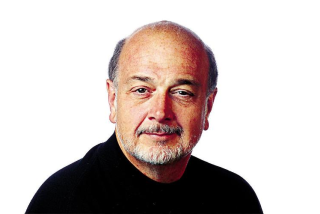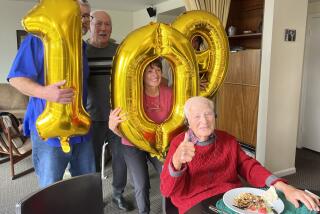A consumer’s guide to the best and worst of sports media and merchandise. Ground rules: If it can be read, played, heard, observed, worn, viewed, dialed or downloaded, it’s in play here.
- Share via
What: tuesdays with Morrie, by Mitch Albom, Doubleday, $19.95
Mitch Albom of the Detroit Free Press is a sports columnist. He is also a cottage industry.
He writes sports, does radio and TV, dabbles in music, and, barely past puberty, has written seven books. Many think there are seven of him. Pick up a paper, turn on a TV, spin your radio dial--Albom will be there.
And the other day, the ultimate. He was on Oprah.
Since Oprah has sportswriters on her show about as often as sportswriters watch her show, this was significant. And once you read Albom’s newest book, “tuesdays with Morrie,” you’ll understand. It is a wonderful book, a story of heart told by a writer with soul.
Albom, as he left college and began building Mitch Albom Media Enterprises Inc., did what many do in pursuit of fame, fortune and Oprah appearances. He lost sight of his past.
And then, one night, there was a large part of his past, talking to Ted Koppel on “Nightline.” His favorite college professor at Brandeis, Morrie Schwartz, was telling Koppel and 17 million other people how he had learned he had a fatal form of cancer and how he was determined to chronicle the steps to his death so that others might somehow benefit. Albom, who had promised to return to visit his old professor but had not, saw the show.
The cottage industry was set aside. The student returned to the professor, at first simply to pay his respects and soothe his guilt. But quickly, professor took student under his wing and began to teach him the toughest course he’d ever had, a course on what it is like to die.
Every Tuesday for several months, Albom flew from Detroit to West Newton, Mass., where Schwartz was living the most public of deaths. There were no denials of the inevitable, no wasting time on false hopes. There was only a rush to chronicle the philosophical views of a man who had a million feelings and ideas, but no hope.
The student’s notes became the book, a bible of living for the dying, and vice versa.
If you can read it without a tear welling, you are not alive. Certainly nowhere near as alive as Morrie Schwartz was on those Tuesdays before his death.
More to Read
Go beyond the scoreboard
Get the latest on L.A.'s teams in the daily Sports Report newsletter.
You may occasionally receive promotional content from the Los Angeles Times.











